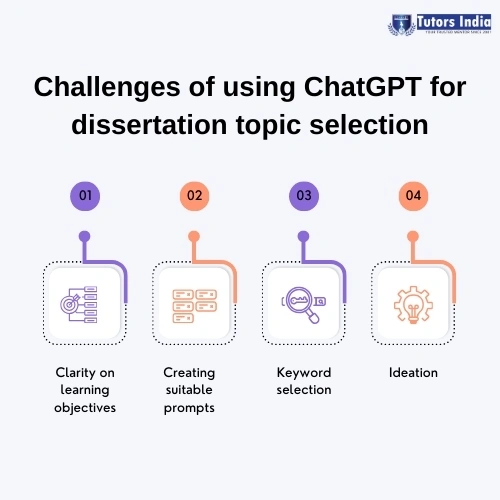What are the Challenges that you might face while choosing a dissertation topic using ChatGPT?
ChatGPT as an adjunct to research endeavors
ChatGPT is a natural language processing tool that was created using a Generative Pre-trained Transformer and is based on artificial intelligence (AI). The salient feature of ChatGPT is the generation of responses in real-time. ChatGPT is trained to create content for essays, describe historical events, provide answers and generate working programming code. The outputs in ChatGPT can resemble human content (Marusenko, 2023).
Herbold et al. (2023) revealed that content generated by ChatGPT generated essays that were structured and of a better quality. This finding implies that ChatGPT could be used as an adjunct for writing essays, assignments and dissertations. However, care should be taken that ChatGPT should be used as an adjunct only and not a substitution for research.
- For more information on the reliability of the content created by ChatGPT for a literature review, check out our blog comparing the content by ChatGPT versus an expert.
ChatGPT for writing a dissertation
ChatGPT can assist students at every stage of the dissertation process. A study by Anik et al. (2023) described the applications of ChatGPT at every stage:
- Dissertation topic- ChatGPT helps narrow down the research objective. Moreover the responses generated could assist students in selecting a suitable dissertation topic.
- Dissertation proposal- ChatGPT helps in rephrasing and organizing the research objectives. It improved wording and gave a logical flow. Moreover, ChatGPT enriched various sections of the research proposal.
- Literature review– ChatGPT could help enhance the literature review by briefing vast information. Also, the tool helped incorporate insights from diverse fields. However, one of the participants observed that ChatGPT should not use ChatGPT to use auto-generated content lest it might provide incorrect references.
- Research methodology- ChatGPT provided insights for choosing a research design. The chatbot helped in comparing the various research designs, allowing the student to frame a suitable methodology. Students must, however, exercise caution with ChatGPT and must thoroughly assess the response before incorporating it for their study for better accuracy.
- Data Collection and Analysis- ChatGPT helped in identifying the most suitable statistical analysis method and played a crucial role in maintaining the coherence of sentences while incorporating insights from another related study.
ChatGPT for dissertation topic selection
Selecting a dissertation topic is critical for writing a high-quality dissertation. Students can use prompts that can help ChatGPT offers thesis subject ideas, which helps to frame a dissertation topic that interests the reader. However, they may face some challenges in the process, which is described in the following section:
Challenges of using ChatGPT for choosing a dissertation topic:
The following are based on the results of an autoethnographic study by Schwenke et al. Autoethnographic study can be best described as the study of personal experiences from diverse cultural settings. The findings are as follows:

- Awareness of learning objectives: Students have to be clear about the learning objectives to obtain the required information from ChatGPT. These comprise of the context and the expected outcomes.
- Development of prompts: Generation of suitable prompts for ChatGPT can be challenging, since ChatGPT is sensitive to inputs and might generate incorrect answers. Therefore, students must be clear about their learning objectives and expected outcomes (Schwenke, 2023).
Other challenges students might face during dissertation topic selection using ChatGPT include:
- Lack of knowledge of keywords: Before seeking ChatGPT’s help for dissertation topic selection, students should be aware of the keywords. Keywords represent the important concepts of the research topic.
- Ideation: Although students can use ChatGPT to suggest relevant topics for their dissertation, they should take care not to directly copy and paste the suggestions, since the responses are based on training and papers relevant to the responses may already have been published. Students must study published papers, identify research gaps and decide on a topic that is feasible.
Students can select two or more responses, combine them, and select a topic that interests them. As stated before, they must conduct thorough research about the topic, decide on its feasibility and then decide it as a topic.
- Check out our study guide to know more on how to select a dissertation topic.
Conclusion
ChatGPT is a natural language processing tool that generates responses in real-time and can create content. Research has shown that ChatGPT can be used by students as an adjunct to research for their master’s dissertation, from dissertation topic selection, proposal, review and data collection, and statistical analysis. However, there are some limitations in using it. For selecting a dissertation topic, students should have clarity on the learning outcomes, selection of appropriate keywords, generating prompts, and selecting a suitable one from the responses. Moreover, students must do a search based on the responses, which will help them to identify the knowledge gap and decide on a more feasible topic which is more feasible.
About Tutors India
Tutors India offers expert dissertation help to the UK master’s students specializing in various disciplines. We comprise a team of PhD-qualified academic writers and researchers with experience in academic writing. We strictly abide by the university requirements while providing dissertation assistance. We understand the importance of selecting an interesting dissertation topic and help students select one that is feasible and interesting and per their university requirements.
To know more about how a dissertation topic is selected, check out our dissertation topic examples.
References
- Marusenko, Roman. (2023). New challenges in assessing students’ knowledge: chatbot ChatGPT and real-time deepfakes.
- Herbold, , Hautli-Janisz, A., Heuer, U. et al.A large-scale comparison of human-written versus ChatGPT-generated essays. Sci Rep13, 18617.
- Anik, M.H., Raaz, S.N.C. and Khan, N., 2023. Embracing AI Assistants: Unraveling Young Researchers’ Journey with ChatGPT in Science Education Thesis Writing.
- Schwenke, N., Söbke, H. and Kraft, E., 2023. Potentials and Challenges of Chatbot-Supported Thesis Writing: Autoethnography. Trends in Higher Education, 2(4), pp.611-635.

 Previous Post
Previous Post Next Post
Next Post